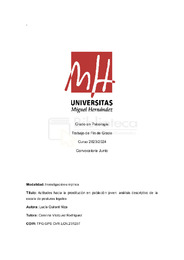Please use this identifier to cite or link to this item:
https://hdl.handle.net/11000/32479Full metadata record
| DC Field | Value | Language |
|---|---|---|
| dc.contributor.advisor | Vázquez Rodríguez, Carolina | - |
| dc.contributor.author | Quirant Niza, Lucía | - |
| dc.contributor.other | Departamentos de la UMH::Psicología de la Salud | es_ES |
| dc.date.accessioned | 2024-07-17T06:51:24Z | - |
| dc.date.available | 2024-07-17T06:51:24Z | - |
| dc.date.created | 2024-06 | - |
| dc.identifier.uri | https://hdl.handle.net/11000/32479 | - |
| dc.description.abstract | La Oficina de las Naciones Unidas contra la Droga y el Delito (UNODC, 2010) coloca en el podio europeo a España como país de destino en víctimas de trata con fines sexuales. Por otro lado, el último informe sobre juventud (Injuve, 2020) alerta del incremento de esta práctica en la población joven. La prostitución se puede ver como el acceso de un varón al cuerpo de una mujer teniendo como meta su propia gratificación sexual y psicológica mediante su abuso (Barahona, 2015), aunque existen distintas conceptualizaciones dependiendo del motivo que se le otorgue, por ejemplo, del enfoque legal. Por ello, el presente trabajo pretende realizar un análisis descriptivo de las actitudes y posturas legales de la población joven. De estos se hallan conclusiones como que las mujeres, las personas de mayor edad o aquellas con ideología progresista tienen actitudes menos favorables hacia la prostitución. Así pues, existen aspectos importantes sobre los que incidir en futuras investigaciones, así como a tener en cuenta en intervenciones socioeducativas o campañas de sensibilización y educación en la juventud. | es_ES |
| dc.description.abstract | The United Nations Office on Drugs and Crime (UNODC, 2010) places Spain on the European podium as a destination country for victims of trafficking for sexual purposes. On the other hand, the latest report on youth (Injuve, 2020) warns of the increase in this practice in the young population. Prostitution can be seen as a man's access to a woman's body with the goal of his own sexual and psychological gratification through abuse (Barahona, 2015), although there are different conceptualizations depending on the reason given, for example, the legal approach. Therefore, this work aims to carry out a descriptive analysis of the attitudes and legal positions of the young population. From these, conclusions are found such as that women, older people or those with progressive ideology have less favorable attitudes towards prostitution. Thus, there are important aspects to focus on in future research, as well as to take into account in socio-educational interventions or awareness and education campaigns for youth. | es_ES |
| dc.format | application/pdf | es_ES |
| dc.format.extent | 46 | es_ES |
| dc.language.iso | spa | es_ES |
| dc.publisher | Universidad Miguel Hernández de Elche | es_ES |
| dc.rights | info:eu-repo/semantics/openAccess | es_ES |
| dc.rights.uri | http://creativecommons.org/licenses/by-nc-nd/4.0/ | * |
| dc.subject | prostitución | es_ES |
| dc.subject | postura legal | es_ES |
| dc.subject | población joven | es_ES |
| dc.subject | análisis descriptivo | es_ES |
| dc.subject | actitudes | es_ES |
| dc.subject | prostitution | es_ES |
| dc.subject | legal position | es_ES |
| dc.subject | young population | es_ES |
| dc.subject | descriptive analysis | es_ES |
| dc.subject | attitudes | es_ES |
| dc.subject.other | CDU::1 - Filosofía y psicología::159.9 - Psicología | es_ES |
| dc.title | Actitudes hacia la prostitución en población joven: análisis descriptivo de la escala de posturas legales | es_ES |
| dc.type | info:eu-repo/semantics/bachelorThesis | es_ES |

View/Open:
Lucía Quirant Niza TFG FINAL.pdf
1,21 MB
Adobe PDF
Share:
Admin Tools
.png)
